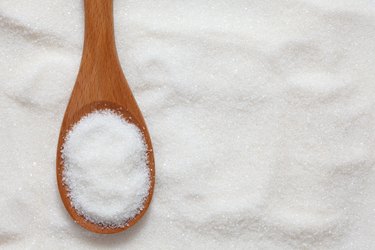
Dealing with a functional gastrointestinal disorder such as constipation is a common occurrence for people of all ages. While certain medications or health issues can disrupt the frequency of your bowel movements, your diet is also a factor, especially with sugar constipation.
Sugar and Digestive Issues
Video of the Day
If you're experiencing fewer bowel movements or going longer than three days without having one, you may be constipated, according to the Cleveland Clinic. As to what causes constipation, the answer can be a variety of factors including diet, medications, dehydration, stress, lack of exercise, certain medical conditions or ignoring the urges to go to the bathroom.
Video of the Day
Some people who are sensitive to certain foods may experience sugar constipation. That's because many products that are high in sugar are also low in fiber. This can set you up for digestive issues such as constipation.
Processed foods such as cakes, cookies, pastries, white bread and candy bars are high in sugar and low in fiber. For this reason, the American Academy of Family Physicians says to prevent constipation, you need to avoid processed foods.
Plus, eating large amounts of dairy products such as milk, which has sugar, can also contribute to constipation, says the Cleveland Clinic. Deserts such as ice cream have both milk and sugar in them, which may trigger digestive issues like constipation.
Sometimes, people may experience diarrhea after eating sugar, and more specifically, foods rich in sucrose, which is table sugar, or fructose, which is fruit sugar. This can happen after certain stomach surgeries or esophageal surgery, says the Mayo Clinic. The condition that may cause this is called dumping syndrome.
Read more: The Effects of Refined Sugar on the Body
Importance of Dietary Fiber
Getting enough fiber in your diet can help prevent and relieve constipation by normalizing bowel movements since it increases the weight and size of your stool and softens it, according to the Mayo Clinic. Just make sure to go slow when increasing your fiber. Adding too much too quickly may cause gas, bloating and cramping.
For optimum health and sugar constipation relief, the Academy of Nutrition and Dietetics says women, aged 50 and younger, should aim for 25 grams of fiber per day, and men of the same age should get 38 grams per day. Women over 51 need 21 grams of fiber and men over 51 need 30 grams.
Adequate amounts of fiber may also help with weight loss since high-fiber food tends to be more filling, says the Mayo Clinic. In addition to making you feel fuller for longer, eating high fiber foods keeps you regular, which may also help you maintain your weight.
To meet the daily fiber recommendations, make sure to look for foods that relieve constipation. Foods that are known to help with digestive issues likely have adequate amounts of fiber and a healthy dose of vitamins and minerals, which can help prevent sugar constipation and keep your bowel movements regular.
Read more: List of Foods High in Soluble Fiber
Foods That Relieve Constipation
When it comes to the best foods that relieve constipation, sticking to foods high in fiber such as fruits, vegetables, beans, legumes and whole-grain products is a great place to start. That said, it's also important to drink plenty of fluids when increasing your fiber intake.
One way to boost your intake of fiber and still satisfy your sweet tooth is to add more fruit to your diet. Some fruits with a higher fiber content include:
- Pears, 1 medium has 5.5 grams of fiber
- Raspberries, 1 cup has 8 grams of fiber
- Apple with skin, 1 medium has 4.5 grams of fiber
- Banana, 1 medium has 3 grams of fiber
- Strawberries, 1 cup has 3 grams of fiber
- Orange, 1 medium has 3 grams of fiber
Other foods high in fiber include black beans, cooked pearled barley, split peas, lentils, oats like those found in oatmeal, bran flakes, brown rice, rye bread, green peas, broccoli and potatoes. In addition to the foods that receive constipation, you should also consider avoiding foods that contribute to the problem.
Processed foods such as chips and hot dogs, fast food, meat, prepared food such as frozen meals and snack foods, can all make constipation worse, according to the National Institute of Diabetes and Digestive and Kidney Diseases.
- The Mayo Clinic: "Dietary Fiber: Essential for a Healthy Diet"
- American Academy of Family Physicians: "Constipation"
- The Cleveland Clinic: "Constipation: Relief, Causes & More"
- Academy of Nutrition and Dietetics: "Easy Ways to Boost Fiber in Your Diet"
- The Mayo Clinic: "Dumping Syndrome"
- The Mayo Clinic: "Chart of High-Fiber Food"
- National Institute of Diabetes and Digestive and Kidney Diseases: "Eating, Diet, & Nutrition for Constipation"
- MayoClinic.com: Healthy Recipes
Was this article helpful?
150 Characters Max
0/150
Thank you for sharing!
Thank you for your feedback!